
National Reformation The Only Proof Of A Due National Humiliation. A Sermon Preached In The Parish Churches Of St. Michael, And The Holy Trinity, In The City Of Coventry, On Friday, The Eleventh Day Of February, 1757. ... By James Parker,

PAYBACK Punkte
7 °P sammeln!
This is a digitally restored and enhanced edition of "National Reformation The Only Proof Of A Due National Humiliation," a sermon preached by James Parker in Coventry, England, on February 11, 1757. Delivered during a period of national concern and introspection, the sermon explores themes of repentance, moral reform, and the relationship between national identity and religious faith. Parker's discourse offers insights into the social and religious climate of 18th-century England, reflecting the era's emphasis on piety and civic duty. This edition preserves the original text, making it access...
This is a digitally restored and enhanced edition of "National Reformation The Only Proof Of A Due National Humiliation," a sermon preached by James Parker in Coventry, England, on February 11, 1757. Delivered during a period of national concern and introspection, the sermon explores themes of repentance, moral reform, and the relationship between national identity and religious faith. Parker's discourse offers insights into the social and religious climate of 18th-century England, reflecting the era's emphasis on piety and civic duty. This edition preserves the original text, making it accessible to contemporary readers interested in historical sermons, religious history, and the cultural context of Georgian England. It serves as a valuable resource for understanding the intersection of religion and national consciousness during a pivotal period in British history. This work has been selected by scholars as being culturally important, and is part of the knowledge base of civilization as we know it. This work was reproduced from the original artifact, and remains as true to the original work as possible. Therefore, you will see the original copyright references, library stamps (as most of these works have been housed in our most important libraries around the world), and other notations in the work. This work is in the public domain in the United States of America, and possibly other nations. Within the United States, you may freely copy and distribute this work, as no entity (individual or corporate) has a copyright on the body of the work. As a reproduction of a historical artifact, this work may contain missing or blurred pages, poor pictures, errant marks, etc. Scholars believe, and we concur, that this work is important enough to be preserved, reproduced, and made generally available to the public. We appreciate your support of the preservation process, and thank you for being an important part of keeping this knowledge alive and relevant.



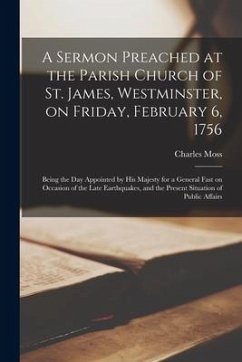
![The Church of God [microform]: a Sermon on Acts XX. 28, Preached in the Parish Church of St. John's, Newfoundland, on Good Friday, 1842 Cover The Church of God [microform]: a Sermon on Acts XX. 28, Preached in the Parish Church of St. John's, Newfoundland, on Good Friday, 1842](https://bilder.buecher.de/produkte/65/65508/65508670n.jpg)
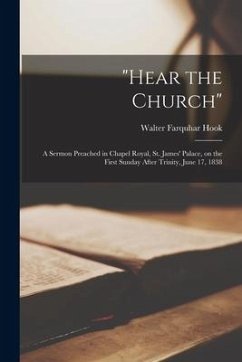
![Perfecting Holiness [microform]: a Sermon Preached Before the Synod of Ontario at Its Eleventh Session, June 4th, 1872, in the Cathedral Church of St. Cover Perfecting Holiness [microform]: a Sermon Preached Before the Synod of Ontario at Its Eleventh Session, June 4th, 1872, in the Cathedral Church of St.](https://bilder.buecher.de/produkte/65/65622/65622717n.jpg)
![Hear the Church [microform]: a Sermon Preached at the Chapel Royal, in St. James's Palace, on the First Sunday After Trinity, June XVII, MDCCCXXXVI Cover Hear the Church [microform]: a Sermon Preached at the Chapel Royal, in St. James's Palace, on the First Sunday After Trinity, June XVII, MDCCCXXXVI](https://bilder.buecher.de/produkte/65/65596/65596297n.jpg)
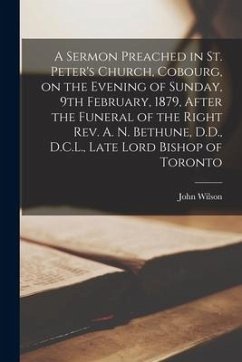
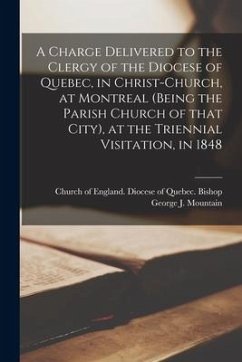
![Rome's Modern Claims [microform]: a Sermon Preached in St. Mark' S Church, St. John, N.B., Twenty-fifth Sunday After Trinity, 1874 Cover Rome's Modern Claims [microform]: a Sermon Preached in St. Mark' S Church, St. John, N.B., Twenty-fifth Sunday After Trinity, 1874](https://bilder.buecher.de/produkte/65/65596/65596893n.jpg)
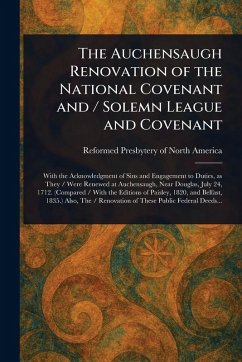
![The Nature, Origin, Progress, Present State, and Character of Wesleyan Methodism [microform]: a Sermon Preached at Picton, Upper Canada, on Friday, th Cover The Nature, Origin, Progress, Present State, and Character of Wesleyan Methodism [microform]: a Sermon Preached at Picton, Upper Canada, on Friday, th](https://bilder.buecher.de/produkte/66/66132/66132187n.jpg)